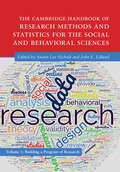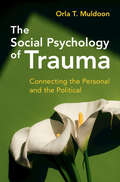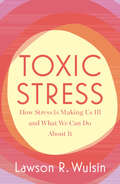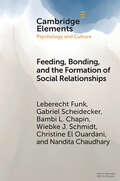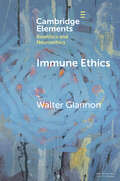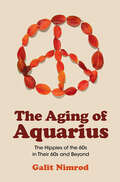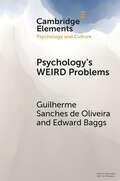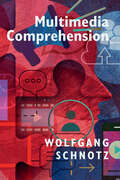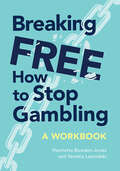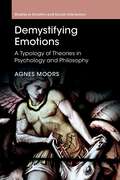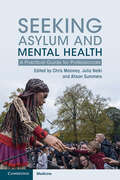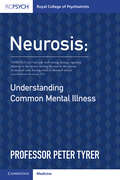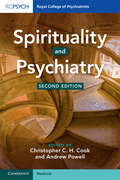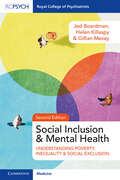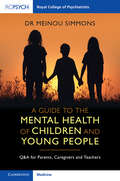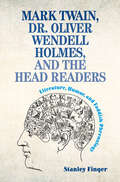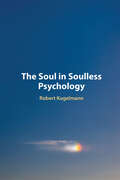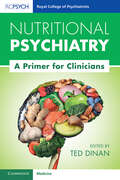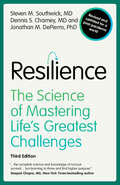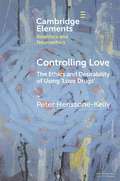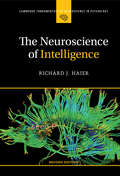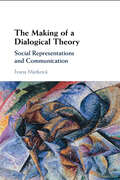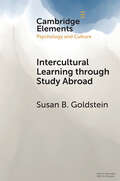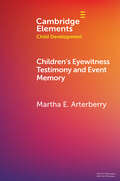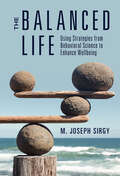- Table View
- List View
The Cambridge Handbook of Research Methods and Statistics for the Social and Behavioral Sciences: Volume 1: Building a Program of Research (Cambridge Handbooks in Psychology)
by Austin Lee Nichols John E. EdlundThe first of three volumes, the five sections of this book cover a variety of issues important in developing, designing, and analyzing data to produce high-quality research efforts and cultivate a productive research career. First, leading scholars from around the world provide a step-by-step guide to doing research in the social and behavioral sciences. After discussing some of the basics, the various authors next focus on the important building blocks of any study. In section three, various types of quantitative and qualitative research designs are discussed, and advice is provided regarding best practices of each. The volume then provides an introduction to a variety of important and cutting-edge statistical analyses. In the last section of the volume, nine chapters provide information related to what it takes to have a long and successful research career. Throughout the book, example and real-world research efforts from dozens of different disciplines are discussed.
The Social Psychology of Trauma: Connecting the Personal and the Political
by null Orla T. MuldoonMany of us have been affected by trauma and struggle to manage our health and well-being. The social psychological approach to health highlights how social and cultural forces, as much as individual ones, are central to how we experience and cope with adversity. This book integrates psychology, politics, and medicine to offer a new understanding that speaks to the causes and consequences of traumatic experiences. Connecting the personal with the political, Muldoon details the evidence that traumatic experiences can, under certain conditions, impact people's political positions and appetite for social change. This perspective reveals trauma as a socially situated phenomenon linked to power and privilege or disempowerment and disadvantage. The discussion will interest those affected by trauma and those supporting them, as well as students, researchers, practitioners, and policy makers in social psychology, health and clinical psychology, and political science. This title is available as open access on Cambridge Core.
Feeding, Bonding, and the Formation of Social Relationships: Ethnographic Challenges to Attachment Theory and Early Childhood Interventions (Elements in Psychology and Culture)
by Leberecht Funk Gabriel Scheidecker Bambi L. Chapin Wiebke J. Schmidt Christine El Ouardani Nandita ChaudharyThis Element explores multi-faceted linkages between feeding and relationship formation based on ethnographic case studies in Morocco, Madagascar, Sri Lanka, Taiwan, and Costa Rica. Research demonstrates that there are many culturally valued ways of feeding children, contradicting the idea of a single universally optimal feeding standard. It demonstrates further that in many parts of the world, feeding plays a central role in bonding and relationship formation, something largely overlooked in current developmental theories. Analysis shows that feeding contributes to relationship formation through what we call proximal, transactional, and distal dimensions. This Element argues that feeding practices can lead to qualitatively distinct forms of relationships. It has important theoretical and practical implications, calling for the expansion of attachment theory to include feeding and body-centered caregiving and significant changes to global interventions currently based on 'responsive feeding.' This title is also available as Open Access on Cambridge Core.
Immune Ethics (Elements in Bioethics and Neuroethics)
by Walter GlannonThe immune system maintains homeostasis within human organisms and protects them from pathogenic threats. But sometimes it cannot provide this protection on its own, and vaccines may be necessary to ensure our health and survival. Immune functions can become dysregulated and result in autoimmune disease or multi-system damage. Pharmacological and genomic interventions may activate or modulate immune functions to prevent these outcomes. This Element is an analysis and discussion of some of the ethical implications of these interventions. After describing the main components of innate and adaptive immunity and how it might be enhanced, it considers the potential benefit and harm from vaccines against addiction and viruses, immunotherapy for cancer, neuroimmunomodulating agents to prevent or treat neurodevelopmental and neurodegenerative diseases, and gene editing of immunity to enable xenotransplantation and prevent infectious disease. The Element concludes with an exploration of a possible outcome of natural competition between humans and microbes.
The Aging of Aquarius: The Hippies of the 60s in Their 60s and Beyond
by Galit NimrodThere is no group of individuals more iconic of 1960s counterculture than the hippies – the long-haired, colorfully dressed youth who rebelled against mainstream societal values, preached and practiced love and peace, and generally sought more meaningful and authentic lives. These 'flower children' are now over sixty and comprise a significant part of the older population in the United States. While some hippies rejoined mainstream American society as they grew older, others still maintain the hippie ideology and lifestyle. This book is the first to explore the aging experience of older hippies by examining aspects related to identity, generativity, daily activities, spirituality, community, end-of-life care, and wellbeing. Based on 40 in-depth interviews with lifelong, returning, and past residents of The Farm, an intentional community in Tennessee that was founded in 1971 and still exists today, insights into the subculture of aging hippies and their keys to wellbeing are shared.
Psychology's WEIRD Problems (Elements in Psychology and Culture)
by Guilherme Sanches de Oliveira Edward BaggsPsychology has a WEIRD problem. It is overly reliant on participants from Western, Educated, Industrialized, Rich, and Democratic societies. Over the last decade this problem has come to be widely acknowledged, yet there has been little progress toward making psychology more diverse. This Element proposes that the lack of progress can be explained by the fact that the original WEIRD critique was too narrow in scope. Rather than a single problem of a lack of diversity among research participants, there are at least four overlapping problems. Psychology is WEIRD not only in terms of who makes up its participant pool, but also in terms of its theoretical commitments, methodological assumptions, and institutional structures. Psychology as currently constituted is a fundamentally WEIRD enterprise. Coming to terms with this is necessary if we wish to make psychology relevant for all humanity. This title is also available as Open Access on Cambridge Core.
Multimedia Comprehension
by Wolfgang SchnotzMultimedia messages use combinations of texts, pictures, maps, and graphs as tools for communication. This book provides a synthesis of theory and research about how people comprehend multimedia. It adopts the perspectives of cognitive psychology, semiotics, anthropology, linguistics, education, and art. Its central idea is that information displays can be categorized into two different but complementary forms of representations, which service different purposes in human cognition and communication. Specific interaction between these representations enhances comprehension, thinking, and problem solving, as illustrated by numerous examples. Multimedia Comprehension is written for a broad audience with no special prior knowledge. It is of interest to everyone trying to understand how people comprehend multimedia, from scholars and students in psychology, communication, and education, to web- and interface-designers and instructors.
Breaking Free: How To Stop Gambling
by Bowden-Jones, Henrietta OBE Venetia Leonidaki Neil SmithHave you ever lied about your gambling habits to anyone, or tried to conceal the fact you've gambled? Have you ever bet more than you could afford to lose, or gone back the next day to try and win back the money you've lost? Your gambling may be becoming problematic and it's time to seek help. Breaking Free: How to Stop Gambling is a self-help workbook, packed full of practical exercises, worksheets and questionnaires, designed to help you assess the extent of your gambling problem, and develop strategies to combat it. The materials use a cognitive behavioural therapy (CBT) approach to guide you through practical steps and techniques that can help you take back control of your habit. All of the materials have been developed by leading experts in the field and are evidence-based interventions, and are designed to help you to break free from your gambling problem.
Demystifying Emotions: A Typology of Theories in Psychology and Philosophy (Studies in Emotion and Social Interaction)
by Agnes MoorsDemystifying Emotions provides a comprehensive typology of emotion theories in psychology (evolutionary, network, appraisal, goal-directed, psychological constructionist, and social) and philosophy (feeling, judgmental, quasi-judgmental, perceptual, embodied, and motivational) in a systematic manner with the help of tools from philosophy of science, allowing scholars in both fields to understand the commonalities and differences between these theories. Agnes Moors also proposes her own novel, skeptical theory of emotions, called the goal-directed theory, based on the central idea that all kinds of behaviors and feelings are grounded in goal-striving. Whereas most scholars of emotion do not call the notion of emotion itself into question, this review engages in a critical examination of its scientific legitimacy. This book will appeal to readers in psychology, philosophy, and related disciplines who want to gain a deeper understanding of the controversies at play in the emotion domain.
Seeking Asylum and Mental Health: A Practical Guide for Professionals
by Chris Maloney Julia Nelki Alison SummersPeople seeking asylum face unique challenges and frequently experience mental health problems. Effective support requires an understanding of their mental health needs in the broader context of their lives, cultures and extreme experiences. This book provides practical guidance for professionals and services working with people seeking asylum in mental health, social care, legal, government. managerial and commissioning roles. With authors from a wide range of professional backgrounds, the book is enriched by accounts from people with first hand experience of the asylum system itself. It considers the challenges and dilemmas faced by all involved, including clients, clinicians and service planners, with a wealth of practical information about how to assess and understand strengths and needs, avoid inappropriate conclusions and discrimination, consider treatment options, and write records and reports. The authors emphasise that effective support depends on reflection, humanity and compassion. The book is a must-have resource for professionals working with those who have to seek asylum.
Neurosis: Understanding Common Mental Illness
by Peter TyrerCommon mental illnesses have been diagnosed separately in recent years, but what is seldom understood is that they are all linked together, often much more closely than other disorders. In particular, combined anxiety and depression linked to personality disturbance, generally known as neuroticism, is very common. In the absence of awareness of its importance, this frequently leads to wrong clinical decisions and poor outcomes for patients. This book focuses on the concept of neurosis, tracing its history as a concept, its abolition from the DSM, the purpose and importance of the Nottingham Study of Neurotic Disorder, the re-definition of neurosis as the general neurotic syndrome, and its recently updated evidence base. Written for psychiatrists, psychologists and researchers, this book shows how recognising these combined common disorders is absolutely necessary for mental health practice, and urges that it is time that we re-examine our treatment priorities.
Spirituality and Psychiatry
by Cook, Christopher C. H. Andrew PowellSpirituality and Psychiatry addresses the crucial but often overlooked relevance of spirituality to mental well-being and psychiatric care. This updated and expanded second edition explores the nature of spirituality, its relationship to religion, and the reasons for its importance in clinical practice. Contributors discuss the prevention and management of illness, and the maintenance of recovery. Different chapters focus on the subspecialties of psychiatry, including psychotherapy, child and adolescent psychiatry, intellectual disability, forensic psychiatry, substance misuse, and old age psychiatry. The book provides a critical review of the literature and a response to the questions posed by researchers, service users and clinicians, concerning the importance of spirituality in mental healthcare. With contributions from psychiatrists, psychologists, psychotherapists, nurses, mental healthcare chaplains and neuroscientists, and a patient perspective, this book is an invaluable clinical handbook for anyone interested in the place of spirituality in psychiatric practice.
Social Inclusion and Mental Health: Understanding Poverty, Inequality and Social Exclusion
by Jed Boardman Helen Killaspy Gillian MezeyPeople with mental health conditions are among the most socially excluded groups in society. Mental health conditions are influenced by the social environment, which in turn shapes our social and cultural responses to the people who experience them. Much of what mental health practitioners do is 'essentially social' and the effects of their interventions are hampered by the marginalised status of many of the people that they see. This book documents the ways in which people with mental health conditions are excluded from participating in society and offers some pointers as to how this may be reversed. It highlights the need to reduce mental health inequalities and to consider the importance of material inequalities and social injustices faced by people experiencing mental ill-health. Whilst the challenges are considerable and the solutions wide-ranging, mental health practitioners can play a significant role in facilitating the social inclusion of those with mental health conditions.
A Guide to the Mental Health of Children and Young People: Q&A for Parents, Caregivers and Teachers
by Meinou SimmonsSupporting the mental health and well-being of children and young people is a top priority for parents, caregivers and teachers, but it can be tricky to find reliable and evidence-based information. Written by an experienced child and adolescent psychiatrist, in a user-friendly question and answer format, this book outlines the mental health challenges facing our children and young people and offers practical advice on how to best support them. The book covers a wide range of topics, including how biological factors and lifestyle factors affect mental health, parenting strategies, managing school, building networks of support, and connecting with children and young people. It gives a broad overview of the most common mental health difficulties and disorders, and considers how they can be managed. A must read for anyone looking to understand what a child or young person may be experiencing and why, and the practical ways in which to effectively support them.
Mark Twain, Dr. Oliver Wendell Holmes, and the Head Readers: Literature, Humor, and Faddish Phrenology
by Stanley FingerHaving a phrenological 'head reading' was one of the most significant fads of the nineteenth century – a means for better knowing oneself and a guide for self-improvement. Samuel Clemens (Mark Twain) had a lifelong yet long overlooked interest in phrenology, the pseudoscience claiming to correlate skull features with specialized brain areas and higher mental traits. Twain's books are laced with phrenological terms and concepts, and he lampooned the head readers in Tom Sawyer and Huckleberry Finn. He was influenced by Dr. Oliver Wendell Holmes, who also used his humor to assail head readers and educate the public. Finger shows that both humorists accepted certain features of phrenology, but not their skull-based ideas. By examining a fascinating topic at the intersection of literature and the history of neuroscience, this engaging study will appeal to readers interested in phrenology, science, medicine, American history, and the lives and works of Twain and Holmes.
The Soul in Soulless Psychology
by Robert KugelmannModern psychology began with a rejection of the 'soul' as relevant for the science. How did that come about? The Soul in Soulless Psychology explores that question and details arguments for a soulless psychology. However, there was also opposition to this notion. This alternative history of psychology examines those who dissented from a 'psychology without a soul,' including Neoscholastic psychologists and others, such as Ladd, Münsterberg, and McDougall. Substitutions for the soul – such as self, personality, and the brain – show that even with the soul absent, its concerns were present. Innovative re-thinkings of the soul are addressed, as well as attempts at restoration of the soul into psychology. Moreover, historical psychologies of the soul kept the soul in view. In the twenty-first century, we find soul as a noun, an adjective, and a verb, all pointing to the necessity of the soul for psychology.
Nutritional Psychiatry: A Primer for Clinicians
by Ted DinanThere is increasing evidence that mental health problems such as schizophrenia, depression and anxiety are linked with poor nutrition. At present, very few psychiatrists provide nutritional advice for their patients, despite such advice complimenting drug and psychological therapies. This edited volume is the first book to provide a comprehensive overview of the relationship between nutrition and mental health, for mental health professionals. Featuring contributions from leading authorities in the field, the book examines the link between diet and the microbiome-gut brain axis and how this correlates with a variety of psychiatric disorders. The book explores how enhancing the beneficial bacteria in the gut, through the use of psychobiotics, prebiotics or dietary change can improve mood and reduce anxiety. The book will appeal to psychiatrists and psychologists, behavioural scientists, neuroscientists and nutritionists.
Resilience: The Science of Mastering Life's Greatest Challenges
by Steven M. Southwick Dennis S. Charney Jonathan M. DePierroLife presents us all with challenges. Most of us at some point will be struck by major traumas such as the sudden death of a loved one, a debilitating disease, or a natural disaster. What differentiates us is how we respond. In this important book, three experts in trauma and resilience answer key questions such as What helps people adapt to life's most challenging situations?, How can you build up your own resilience?, and What do we know about the science of resilience? Combining cutting-edge scientific research with the personal experiences of individuals who have survived some of the most traumatic events imaginable, including the COVID-19 pandemic, this book provides a practical resource that can be used time and time again. The experts describe ten key resilience factors, including facing fear, optimism, and relying on role models, through the experiences and personal reflections of highly resilient survivors. Each resilience factor will help you to adapt and grow from stressful life events and will bring hope and inspiration for overcoming adversity.
Controlling Love: The Ethics and Desirability of Using ‘Love Drugs' (Elements in Bioethics and Neuroethics)
by Peter Herissone-KellyRecent research in neurochemistry has shown there to be a number of chemical compounds that are implicated in the patterns of lust, attraction, and attachment that undergird romantic love. For example, there is evidence that the phenomenon of attachment is associated with the action of oxytocin and vasopressin. There is therefore some reason to suppose that patterns of lust, attraction, and attachment could be regulated via manipulation of these substances in the brain: in other words, by their use as 'love drugs'. A growing bioethical literature asks searching questions about this prospect, and especially about the use of such drugs to enhance or reignite attachment in flagging relationships. This Element examines some of the central arguments on the topic, and sounds a note of caution. It urges that there are reasons to think the states of attachment produced or facilitated by the use of such drugs would not be desirable.
The Neuroscience of Intelligence (Cambridge Fundamentals of Neuroscience in Psychology)
by Richard J. HaierThis new edition provides an accessible guide to advances in neuroscience research and what they reveal about intelligence. Compelling evidence shows that genetics plays a major role as intelligence develops from childhood, and that intelligence test scores correspond strongly to specific features of the brain assessed with neuroimaging. In detailed yet understandable language, Richard J. Haier explains cutting-edge techniques based on DNA and imaging of brain connectivity and function. He dispels common misconceptions – such as the belief that IQ tests are biased or meaningless. Readers will learn about the real possibility of dramatically enhancing intelligence and the positive implications this could have for education and social policy. The text also explores potential controversies surrounding neuro-poverty, neuro-socioeconomic status, and the morality of enhancing intelligence for everyone.
The Making of a Dialogical Theory: Social Representations and Communication
by Ivana MarkováCreating a stimulating social theory with long-lasting influence for generations of scholars is driven by multiple interacting factors. The fortune of a theory is determined not only by the author's creative mind but also by the ways in which principal concepts are understood and interpreted. The proper understanding of a social theory requires a good grasp of major historical, political, and cultural challenges that contribute to its making. Considering these issues, Marková explores Serge Moscovici's theory of social representations and communication as a case study in the making of a dialogical social theory. She analyses both the undeveloped features and the forward-moving, inspirational highlights of the theory and presents them as a resource for linking issues and problems from diverse domains and disciplines. This dialogical approach has the potential to advance the dyad Self–Other as an irreducible intellectual, ethical, and aesthetic unit in epistemologies of the human and social sciences.
Intercultural Learning through Study Abroad (Elements in Psychology and Culture)
by Susan B. GoldsteinOver the past three decades, the population of international students throughout the world has steadily increased. Although university students choose to study in locations other than their home country for a variety of reasons, including professional development and disciplinary training, nearly all education abroad programs have intercultural learning as a central goal. In this Element, perspectives derived from cross-cultural psychological research are applied to an investigation of the effectiveness of study abroad as a mechanism for intercultural learning. Effectiveness is broadly defined and includes not only overall favorable program outcomes, such as gains in intercultural skills, knowledge, attitudes, and awareness, but also a recognition that study abroad experiences and outcomes may vary depending upon participants' diverse and intersectional identities. Best practices for facilitating intercultural learning through study abroad are identified and strategies are outlined for addressing the methodological challenges of research in this area.
Children's Eyewitness Testimony and Event Memory (Elements in Child Development)
by Martha E. ArterberryThis Element addresses the factors that influence children's accuracy in reporting on events and draws implications for children's ability to serve as reliable eyewitnesses. This Element focusses on short- and long-term memory for event details, memory for stressful events, memory for the temporal order of events, memory for the spatial location of events, the ways poorly worded questions or intervening events interfere with memory, and individual differences in language development, understanding right from wrong and emotions, and cognitive processes. In addition, this Element considers how potential jurors perceive children as eyewitnesses and how the findings of the research on children's event memory inform best practices for interviewing children.
The Balanced Life: Using Strategies from Behavioral Science to Enhance Wellbeing
by M. Joseph SirgyThe balanced life is a state of equally moderate-to-high levels of satisfaction in important and multiple life domains that contribute to overall life satisfaction. This book strives to improve the reader's understanding of what the balanced life is, and how it can be both achieved and maintained. Its primary goal is therefore to identify the major principles of life balance, and to introduce a comprehensive construct of the balanced life reflective of these principles. It discusses how life balance substantially contributes to subjective well-being – defined as life satisfaction, a preponderance of positive over negative feelings, and absence of ill-being – and explores strategies to attain life balance. It argues that achieving life balance, through manipulating one's thoughts and taking concrete action, will lead to increased personal happiness. Aimed at professional, academic, and lay audiences, this book is grounded in scientific studies related to work-life balance and the balanced life.
